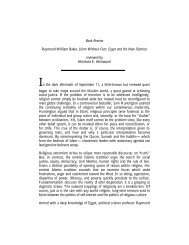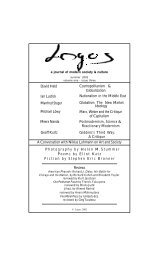Michael J. Thompson Stephen Eric Bronner Wadood Hamad - Logos
Michael J. Thompson Stephen Eric Bronner Wadood Hamad - Logos
Michael J. Thompson Stephen Eric Bronner Wadood Hamad - Logos
Create successful ePaper yourself
Turn your PDF publications into a flip-book with our unique Google optimized e-Paper software.
Stanley Aronowitz<br />
which, in relation to knowledge, has no interest in reproducing the<br />
mystifications which buttress bourgeois rule. According to Lukács, Marxism<br />
can penetrate the veil of reified social relations to reveal the laws of motion of<br />
capitalism and, therefore, produce a truthful account of how society works.<br />
Mills was much too skeptical to buy into this formulation; Mannheim’s<br />
relativism—that “standpoint” thinking inevitably led to partial knowledge—<br />
was more attractive and corresponded to his own pragmatic vision.<br />
Accordingly, knowledge is always infused with interest, even if it occurs behind<br />
the backs of actors. But Mills leans toward ideology as an expression of<br />
intentionality and this characterization is particularly applied to the labor<br />
leaders who are the subjects of The New Men of Power, and the business élite<br />
described in an essay republished in the collected essays, Power Politics and<br />
People and later incorporated in The Power Elite. Lacking an explicit ideology<br />
does not mean that labor or corporate leader can dispense with the tools of<br />
persuasion. But according to Mills, these are the tools of a “practical politician”<br />
rather than that of an ideologue. Thus, Mills’s employment of the word<br />
“rhetoric” to describe how leaders persuade and otherwise justify their<br />
constituencies of policies and programs that may or may not be in their<br />
interest.<br />
Mills was also a close reader of the political and social thought of John Dewey,<br />
perhaps America’s preeminent philosopher of the first half of the 20th century<br />
and one of the leading figures in the development of pragmatism. From<br />
Dewey and from his interlocutor, Walter Lippmann, whose debate with<br />
Dewey on whether there was a chance for a genuine democratic society and<br />
governance in an America increasingly dominated by experts, was among the<br />
most important intellectual events of the 1920s. Mills derived the concept of<br />
the “public” or, in his usage, “publics” from this controversy. By the time<br />
Lippmann’s Public Opinion (1921) appeared, many intellectuals expressed<br />
doubts that the ideal of the public as the foundation of a democratic polity,<br />
which made decisions as well as conferring consent, was at all possible in the<br />
wake of the emergence of mass society with its mass publics and massified<br />
culture.<br />
Lippmann argued, persuasively to many, that a public of independent-minded<br />
individuals was, by the end of World War I, decisively foreclosed by the<br />
complexity of international relations, by advanced technology, the reduction of<br />
<strong>Logos</strong> 2.3 – Summer 2003




